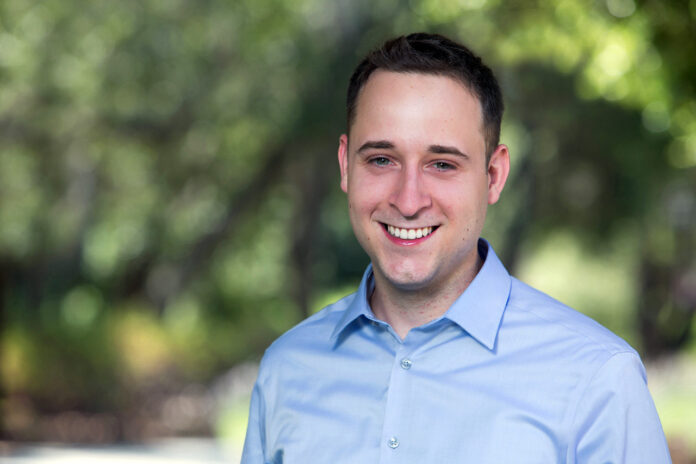
David Broockman, 33, of San Francisco, has been studying stories for almost 10 years. The associate professor of political science at UC Berkeley researches how specific, personal narratives, told face to face, can help sway minds on highly divisive political issues – or, to put it shortly, how human connections may be the key to reducing bias.
In September, Broockman and his research partner, Joshua Kalla of Yale University, were among 10 people selected for the inaugural cohort of the Anti-Defamation League’s Center for Antisemitism research fellowships.
The fellowship, with a stipend of $10,000 to $30,000 per project, will allow them to expand their research to study what kinds of stories can alleviate antisemitism.
J.: Tell me about the research you do with your partner, and what it has to do with stories?
David Broockman: The two of us have been working for almost a decade now on a series of projects involving door-to-door canvassing and other forms of interpersonal outreach, and how it can reduce prejudice. One lesson that’s really come out of those studies is that stories are really important. Hearing stories about members of a certain group seems to, in our research, really have a big effect on views toward those groups.
What types of stories are you talking about?
The people that we’ve worked with that have gone door to door to have these conversations have told all kinds of stories about members of these groups.
Sometimes you’d have a canvasser going door to door talking about a story of an undocumented immigrant friend who faced big challenges due to legal barriers. Other times, it might be a transgender person who was able to succeed and how the law helps them do that. And something that we found in our research, that I think has particularly taken us aback a bit, is that the effects we found of these kinds of interpersonal conversations have endured.
RELATED: Stanford apologizes for Jewish admissions quotas in the 1950s
Do you know which stories are most effective related to antisemitism?
That is something that we are looking at in this project supported by the ADL — essentially building on the research we’ve done. The experiments we’re going to do are all based in survey-based research; not sending people out, but showing people videos, having them read stories, things like this. We’re going to try to understand the impacts of those on people’s attitudes toward Jews and other groups.
In this polarized time, what does your research have to say about convincing people to let go of their prejudices?
There are two approaches to try to think about how to reduce bias and prejudice and its manifestations. One approach, which has a lot of value to it, is the idea of saying, “You know what? Changing prejudiced attitudes is really difficult. But even if we can’t do that, we can probably try to stigmatize it or change norms so that we change people’s behavior.”
It’s hard to take someone who grew up in the Jim Crow South and turn them into someone who loves African Americans, but at the very least you could convince them that if they use racial slurs or discriminate in hiring that they’re going to be judged negatively, or it’ll be against the law.
What’s the other approach?
If we want to change the hearts and minds of the people who harbor that prejudice, part of what we — maybe counterintuitively — might need to do is not tell them, “Well, there’s something wrong with you,” but say, “Well, let’s talk about it. Why do you think that?”
It’s not just I knock on your door and I say, “Don’t be prejudiced.” I say, “What do you think?” And try to basically make people less defensive.
I think the interesting tension that comes up in some of our work is that we found that these conversations are effective in part because they involve not judging people, and [instead] having these two-way, more nonjudgmental conversations. Because I think that’s part of what then opens them to be willing to hear what we have to say.
Today we live in an age when people are so quick to condemn, and it’s all about piling on, on social media, in person, all this stuff. And I think what our research has found is that that kind of approach of just telling people that what they think is wrong — even if we really do strongly believe and know it’s wrong — often makes it harder to change minds. I think anyone looking for a magic bullet to reduce prejudice … I would say, that doesn’t exist. It’s all about the slow, steady work. We don’t have a magic wand that can turn all antisemites into non-antisemites.
What draws you to this field?
I’ve always been interested in this topic, really just as like a tikkun olam kind of question. I’m also gay. My grandfather fled the Holocaust to Israel and then immigrated to the U.S. I feel like both being Jewish and gay, I’m very aware that I am I am benefiting from, and can only have the life I have — with a partner and everything else, living here having a job at UC Berkeley — because of the work previous generations have done to try to reduce prejudice and change social norms. That’s part of what motivates me to try to understand how we can help pave the way for other groups.








